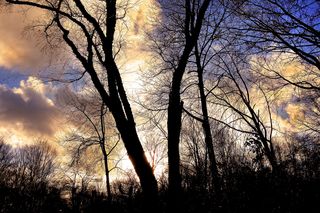
Psychopharmacology
Can Marijuana Trigger Schizophrenia?
What's the relationship? Henry Cockburn's story may be an example.
Posted January 5, 2018 Reviewed by Abigail Fagan

Henry Cockburn’s first hospitalization for schizophrenia was in February of 2002. At the age of 20, he was attending an art school in Brighton, in the UK, when he felt the need to go “walking barefoot along the edge of the sea… I felt brambles, trees, and wild animals all urging me on. It was as if they were looking at me and I could feel what they thought.
“I walked ten miles … to the estuary and hid by a low wall. I didn’t want to go into the water at first, but finally, I did ... I was there when a fisherman held out his hand.” That incident ended with his admission to a psychiatric hospital. There a doctor told him he had a mental illness. “I didn’t think of it as an illness but as an awakening, a spiritual awakening. I thought there was another side to the world I hadn’t seen before.” Over the years of his illness, he continued to run away periodically, even as he was moved to ever more secure facilities to prevent him from escaping. By his own count, he escaped some 30 times.
Once he was away from the hospital, he would strip and swim in the English Channel or wander the countryside naked for days hearing the voices of the natural world, without thinking of the risks to his life. His parents lived in dread of the telephone call telling them that once again he had managed to break out of the hospital. Frightening days and nights followed until he was found.
What makes Henry’s Demons special is that chapters in Henry’s voice are incorporated into the narrative told by his father, the journalist Patrick Cockburn. Patrick tells the story of Henry’s life: a lively, intelligent and talented youngster whose breakdown came in his first year of art school, six years in one hospital after another suffering serious mental illness, and eventually, his acceptance that the medication he had resisted for so long would help him keep away his “polka dot days,” and his move to a step-down facility in London. Patrick reports on his own education about schizophrenia, following Henry’s diagnosis: his work to understand what the illness is, his recognition as he talked to friends about Henry that schizophrenia is common, hidden only by people’s reluctance to talk about their relatives who suffer with it.
Henry describes his use of marijuana, which began at 14. “My teenage years would have been different without marijuana. I was taking a lot of hash, maybe an eighth of an ounce ... It would have been better if I hadn’t, but about half the people I knew … were smoking dope.
“The worst thing about smoking weed when you’re a kid is that you never really grow up. Your life turns into a sort of haze."
Henry’s marijuana use is worth considering. An association between marijuana and schizophrenia has been recognized for some years, though it hasn’t been clear whether marijuana caused schizophrenia or was used as self-medication, or even if both of these possibilities might be true. One recent study done at Tel Aviv University found that when mice with a genetic susceptibility to schizophrenia were exposed to THC, the psychoactive compound in marijuana, they showed schizophrenia-like effects, while mice without susceptibility did not. [1]
Hannelore Ehrenreich of the Max Planck Institute conducted another recent study of marijuana use, reported in Scientific American. Her research was based on a sample of 1,200 people with schizophrenia. Comparing the age of onset of those who used cannabis before they were 18 to the age of onset for those who didn’t, they found significantly earlier onset for the former group. The more often marijuana was used, the earlier the age of onset. Robin Murray of King’s College London, another researcher into the connection between marijuana and schizophrenia, supports Ehrenreich’s findings on cannabis, saying. “The more you take—and the higher the potency—the greater the risk.” [2]
There are still many who reject the idea that marijuana is one of the environmental factors that can act on a genetic susceptibility to trigger schizophrenia. Considering the terrible pain of those hit by schizophrenia and their families, I feel we should do everything we can to discourage teenagers with family histories of mental illness from using marijuana at least until they are adults.
Henry’s words end the book: “It has been a very long road for me, but I think I’m entering the final straight. There is a tree I sit under in the garden in Lewisham which speaks to me and gives me hope.” As someone who has often drawn strength from trees, I wish Henry well.
References
[i] American Friends of Tel Aviv University. (2017, April 26). Cannabis use in adolescence linked to schizophrenia: Psychoactive compound in cannabis may trigger the brain disorder, researchers say. ScienceDaily. Retrieved January 4, 2018 from www.sciencedaily.com/releases/2017/04/170426124305.html
R Douglas Fields. (2017, October 9) Link Beween Adolescent Pot Smoking and Psychosis Strengthens: Research presented at a Berlin psychiatric conference show teenage cannabis use hastens onset of schizophrenia in vulnerable individuals. Scientific American. Retrieved January 4, 2018 from https://www.scientificamerican.com/article/link-between-adolescent-pot-…

